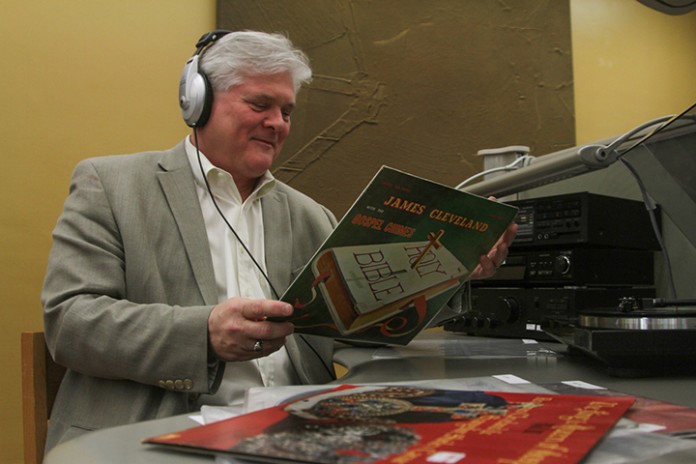
By Haley Morrison, reporter
Black Gospel music was created to sustain both the singers and listeners, to give life and hope when times were hard.
While the listeners survived with the help of music, very few of the songs did. Associated journalism professor Robert Darden and the Baylor Libraries are trying to fix that.
Years ago, Darden began trying to recover Black Gospel music with the help of the Baylor Libraries. Together, they search for Black Gospel music and restore the findings, which are then added to the Baylor digital collections.
“I’ll do an interview and people will hear about the project and say ‘you know, there is a box of old vinyl in grandma’s attic.’” Darden said. “For me, it’s like Christmas every day because I never know what we are going to get, and then we digitalize, catalog, and scan. The whole process takes quite a while, because it’s done in real time.”
While Darden enjoys the process, it is an arduous one.
“I don’t know if we’ll ever get it all. I fear every day that things are slipping away,” said Darden.
Darden and the libraries look mainly for the songs from the 1940’s to the mid-60s. Unfortunately, not a lot of Black Gospel music was saved during this time.
“All we know about some relatively important people is what we have on disc; no interview was ever done during their lives,” Darden said.
“From a historic standpoint, both for the Civil Rights era and African American history, it’s not just the foundation of American pop music, it is the music that sustained and gave hope and courage during the hardest time of their history, and freedom songs and gospel songs came out of that.”
The Baylor Library says it hosts the largest repository of Black Gospel music in the world. Baylor students can access it at any time.
“Anyone with a Bear ID and password can use it anywhere in the world,” Ames said.
Because of the historical importance of this project, the digital collections will be able to be viewed at the Smithsonian’s new National Museum of African American History and Culture, located in Washington D.C.
“This is the first connection between Baylor and the Smithsonian,” Eric Ames, the Curator of Digital Collections, said. “We will have a permanent exhibit in there that deals with music, and somehow the users will have access to the digital collections.”
Around half of the music is found due to word of mouth, while the other half comes from Gospel music collectors from around the world, according to Darden. Because of this, it is important to get the word out.
“We are the first to do this so it’s really important for us to do this right,” Ames said.
While this collection is the only one of it’s kind, it has been enjoyed by many around the globe.
“This belongs to the world because scholars around the world have come here to listen to it, because it is the only place they can,” Darden said.
In addition to finding old gospel music, Darden and the Central Libraries also search for old Black Gospel sheet music and African American preacher’s sermons. In the future, Ames also hope to add lyrics and key words to the collections, in hopes of making it easier for scholars to find the music they are searching for.
“I would like to see this sustained and continued long after I am gone, because I don’t believe we will ever complete it,” Darden said.
While the project may never be completed, Darden considers it worth pursuing.
“This music has a power greater than any other music, not just in Ferguson or Staten Island or a place where African lives were lost, but they were sung when the Berlin Wall fell, during the protests in Hong Kong, or when the Tibetan women’s soccer team wasn’t allowed to participate,” Darden said.
“There was a video of them holding hands and singing ‘We Shall Overcome,’ thousands of miles from Selma, Ala., and not Christian, but knowing that this music saves. That’s why this music is important.”



